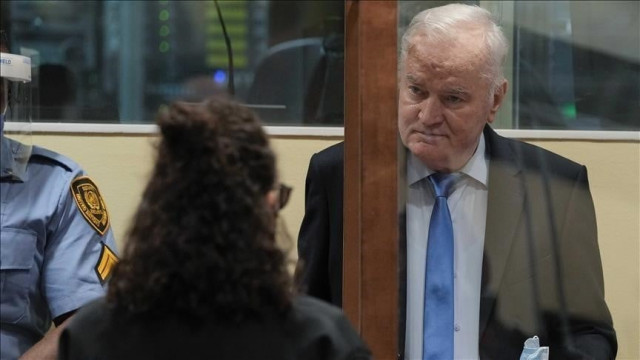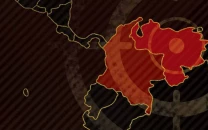'Butcher of Bosnia' suffers major health issues 5 years into life sentence for genocide
Ratko Mladic was convicted in November 2017 of Srebrenica genocide

On the fifth anniversary on Tuesday of Ratko Mladic's life sentence for his role in the Bosnian genocide, the convicted war criminal is suffering from serious health issues.
Dubbed the "butcher of Bosnia," Mladic was once Europe's most wanted for crimes as one of the masterminds behind the continent's most well-documented and widely known genocide and crimes against humanity
A convicted war criminal, Mladic is today suffering serious health concerns in the Dutch prison where he is being held.
According to earlier reports in Serbian media, he is currently in critical condition.
"He was taken to the prison hospital due to general weakness, lung inflammation, and heart complaints. Controls continue. We were informed that the results will be known on Monday at the latest," his son Darko Mladic said.
Mladic was the commander of the Army of Republika Srpska, established in Bosnia-Herzegovina at the beginning of the country's civil war amid the breakup of Yugoslavia in the 1990s.
He and the forces under his command were linked to the genocide committed in Bosnia, particularly in Srebrenica after Serb forces overran an enclave supposedly under the protection of UN peacekeepers.
Also read: UN rights council eyes probe of Iran crackdown
However, Mladic is also known for his forces' bloody 1,425-day siege of Sarajevo, the longest against a capital city in the history of modern warfare.
After the war ended with the Dayton Accords of November 21, 1995, Mladic became a fugitive for over a decade.
A 15-year manhunt ended in 2011 when he was found and handed over to The Hague tribunal for trial.
Mladic's trial began on May 16, 2012, and ended with summations in December 2016.
The trial, which lasted more than 500 days, called 591 witnesses and saw nearly 10,000 pieces of evidence accepted by the court.
In 2017, the International Criminal Tribunal for the former Yugoslavia in The Hague unanimously found Mladic guilty of culpability in the Srebrenica murders, which took place towards the end of the country's brutal three-year civil war.
Mladic was found guilty of 10 out of 11 items in the indictment.
He faced two counts of genocide, among other crimes, but although the court found him guilty over his role in Srebrenica, he was found not guilty of genocide in six other Bosnian municipalities.
He was also convicted of a string of crimes against humanity, including persecution, extermination, murder, murder as a violation of the laws of war, and forced deportations.
The 78-year-old appealed his conviction for genocide and crimes against humanity at a court in The Hague, but this was rejected.
Also read: France shocked by second schoolgirl rape and murder in a month
Srebrenica Genocide
Despite the passage of 27 years since the genocide in Srebrenica, Bosnia-Herzegovina and the world continue to bid farewell to newly identified victims.
Every year on July 11, the newly identified genocide victims are laid to rest at a memorial cemetery in the eastern village of Potocari.
Thousands of visitors from various countries attend the service.
More than 8,000 Bosnian Muslim men and boys were killed when Bosnian Serb forces attacked the eastern town of Srebrenica in July 1995, despite the presence of Dutch peacekeeping troops.
The Serb forces were trying to wrest territory from Bosnian Muslims and Croats to form a state.
The UN Security Council had declared Srebrenica a "safe area" in the spring of 1993. However, troops led by Mladic overran the UN zone.
Dutch troops failed to act as Serb forces occupied the area, killing some 2,000 men and boys on July 11 alone.
Around 15,000 residents fled to the surrounding mountains, but Serb troops hunted down and killed 6,000 more people.
The bodies of victims have been found at 570 locations across the country.
In 2007, the International Court of Justice in The Hague ruled that genocide had been committed in Srebrenica.
On June 8, 2021, UN tribunal judges upheld in a second-instance trial a verdict sentencing Mladic to life in prison for the genocide, persecution, crimes against humanity, extermination, and other war crimes in Bosnia-Herzegovina.



















COMMENTS
Comments are moderated and generally will be posted if they are on-topic and not abusive.
For more information, please see our Comments FAQ